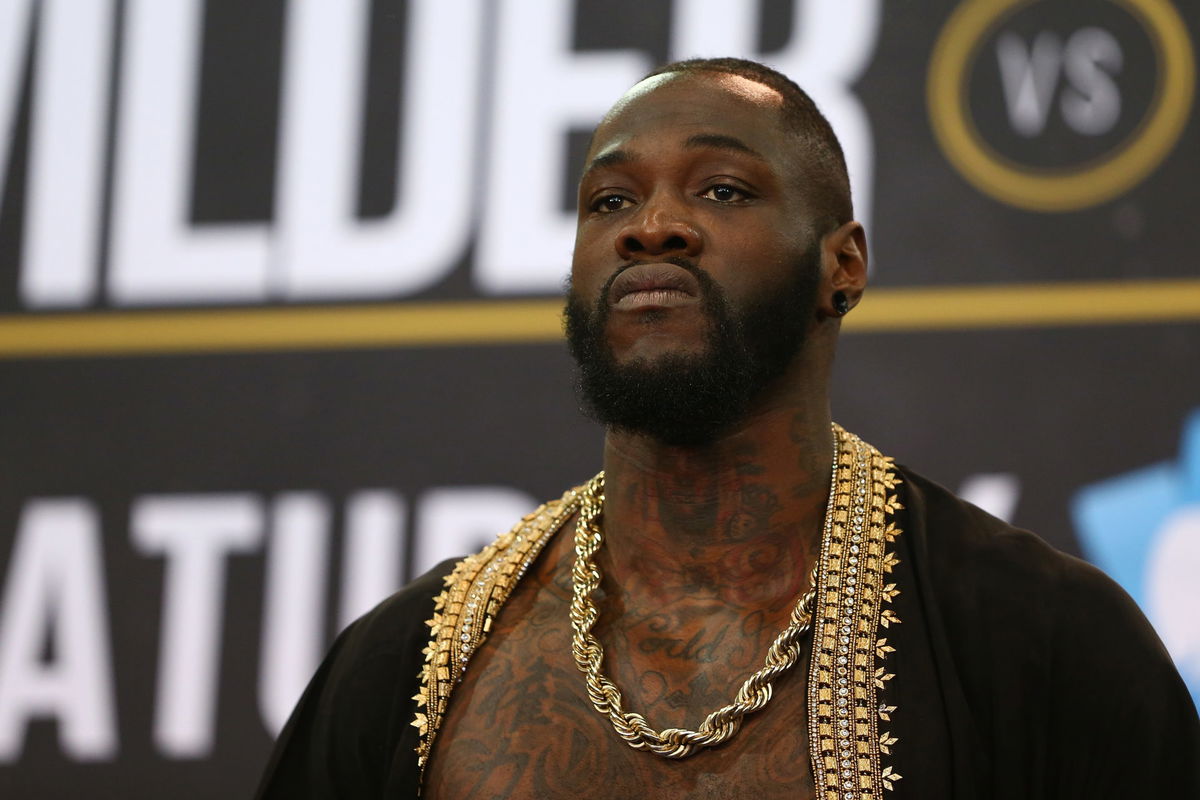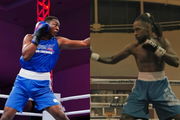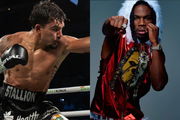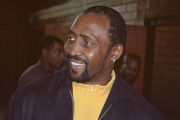
Getty
NEW YORK, NY – MAY 17: Deontay Wilder looks on during his official weigh-in against Dominic Breazeale at LIU Athletic Center on May 17, 2019 in the Brooklyn borough of New York City. (Photo by Mike Stobe/Getty Images)

Getty
NEW YORK, NY – MAY 17: Deontay Wilder looks on during his official weigh-in against Dominic Breazeale at LIU Athletic Center on May 17, 2019 in the Brooklyn borough of New York City. (Photo by Mike Stobe/Getty Images)
Deontay Wilder, once a knockout artist, faced an unexpected downfall against Joseph Parker. Riyadh’s Kingdom Arena witnessed a narrative shift; Wilder’s famed right hand faltered. The unanimous decision was clear, yet Wilder’s post-fight celebration puzzled many. This loss not only dented his legacy but also cast a shadow over the anticipated clash with Anthony Joshua.
Watch What’s Trending Now!
Wilder hinted at retirement, stirring debates among fans and analysts. What’s more intriguing? Wilder’s performance might have closed the door on a $100 million payday against Joshua. Not a very good night for Wilder, or is it all for the best?
ADVERTISEMENT
Wilder’s struggle in the ring: A performance marred by uncharacteristic missteps
In a stark departure from his renowned knockout prowess, Deontay Wilder’s performance against Joseph Parker on Saturday revealed vulnerabilities previously unseen. The former WBC belt holder, known for his explosive power and aggressive style, appeared off-balance, hesitant, and struggled to find his rhythm. His punches, usually sharp and decisive, lacked their usual ferocity. The stats spoke volumes: Parker landed 35% of the total punches thrown while Wilder could only connect 19% of the total punches thrown. Wilder’s right hand, once a feared weapon in the boxing world, could barely make a significant connection against Parker.
ADVERTISEMENT
Parker, on the other hand, executed a well-crafted strategy, evading Wilder’s shots with ease. “He worked well, evading my shots. So, no excuses,” Wilder admitted in a post-match reflection. This candid acknowledgment from the Bronze Bomber underscored a night where his usual dominance in the ring was conspicuously absent. The scorecards—118-111, 118-110, and 120-108—were a testament to Parker’s control throughout the bout.
ADVERTISEMENT
Wilder’s unexpected approach, coupled with Parker’s tactical superiority, led to a performance that veered drastically from the knockout specialist’s storied career. This fight not only marked a significant upset but also raised questions about Wilder’s future in the heavyweight hierarchy.
Top Stories
Jahmal Harvey vs. Kevin Cervantes Stats Comparison and Prediction: Record, Age, Height, Reach, Weight, Knockout Ratio, and Rankings

Keno Marley vs. Diarra Davis Jr. Stats Comparison and Prediction: Record, Age, Height, Reach, Weight, Knockout Ratio, and Rankings

Avious Griffin vs. Justin Cardona Stats Comparison and Prediction: Record, Age, Height, Reach, Weight, Knockout Ratio, and Rankings

Alycia Baumgardner Boyfriend/Husband: All About Her Relationship Status and Dating History

Fact Check: Is Boxing Legend Thomas ‘Tommy Hitman’ Hearns Missing?

Retirement Speculations: Between Wilder’s uncertainty and Froch’s blunt assessment
Post-fight, Deontay Wilder’s retirement musings added a layer of intrigue to his career narrative. “We’ll see what’s next. I believe there’s still something left in me,” reflected a boxer at a crossroads, pondering the longevity of his time in the ring. This contemplation of retirement came as a jolt to fans and commentators alike, stirring a mix of concern and speculation about his future.
ADVERTISEMENT
Carl Froch, a former professional boxer, offered a starkly blunt perspective on Wilder’s situation. “I feel that those [Fury] fights have taken a lot out of Deontay Wilder,” Froch opined, suggesting that past battles had diminished Wilder’s prowess. “I think he’s about finished,” Froch concluded, painting a grim picture of Wilder’s potential decline.
View this post on Instagram
Despite the retirement speculations, Wilder himself hinted at a comeback. “We will be back though. That’s the good thing about it,” he assured his fans. This assertion of return, albeit tentative, suggested that Wilder might not be ready to hang up his gloves just yet.
ADVERTISEMENT
From an analytical standpoint, Wilder’s career is at a defining juncture. The balance between a fighter’s physical capabilities and the wear of time is delicate. Whether Wilder can rejuvenate his career and silence critics like Froch remains an unfolding story, adding an element of suspense to his already storied boxing journey.
The $100 million Joshua fight on hold
Deontay Wilder’s defeat to Joseph Parker not only raised questions about his career trajectory but also put a lucrative potential fight with Anthony Joshua in jeopardy. This matchup, touted to be worth around $100 million, represented not just a financial windfall but a high-profile event for boxing enthusiasts worldwide. Wilder’s loss, however, has abruptly shifted this narrative.
ADVERTISEMENT
Promoter Eddie Hearn, a central figure in orchestrating major boxing events, expressed the immediate implications of Wilder’s defeat. “It’s ruined our plans,” Hearn lamented. In another interview, Hearn even went as far as to suggest another name instead of Wilder for a future fight against AJ. “Obviously [Joshua] is in a position to fight for the world title against [Filip] Hrgovic,” said Hearn, advancing the name of the Croatian Heavyweight who won a fight earlier that night against Mark De Mori. The loss undeniably threw a wrench into the plans for a mega-bout that had fans and pundits buzzing with anticipation.
ADVERTISEMENT
The fallout from Wilder’s performance extends beyond the ring. Financially, the setback is enormous, considering the potential earnings from a Wilder-Joshua fight. Strategically, it forces a reevaluation of the match-ups in the heavyweight division. The boxing community now looks towards new narratives and possibilities, as Wilder’s path forward remains uncertain.
In this context, Wilder’s next move is more than a personal decision; it’s a pivot point that will reshape the future of heavyweight boxing. The anticipated clash with Joshua, once seen as almost inevitable, now hangs in the balance, underscoring the unpredictable nature of the sport.
ADVERTISEMENT
Also Read: Deontay Wilder Net Worth in 2023: Career Earnings, Endorsements, Investments, Charity, and More
Wilder stands at a pivotal crossroads: Will he rise from this setback to reclaim his status, or has the curtain begun to close on his storied career? What do you think the future holds for Deontay Wilder?
Watch this story: Epic Ring Walks of Deontay Wilder
ADVERTISEMENT
ADVERTISEMENT
ADVERTISEMENT

